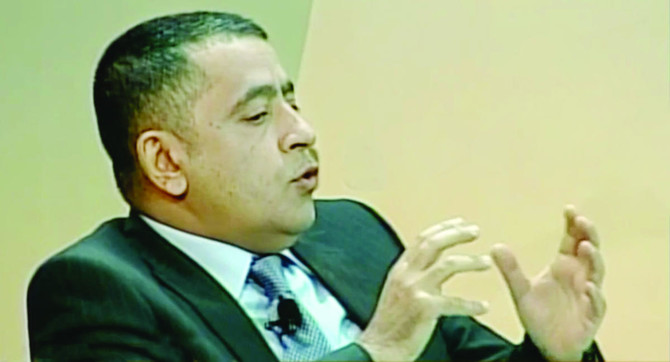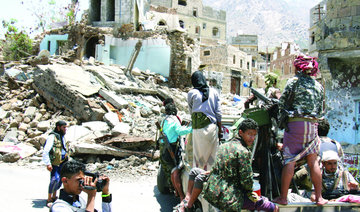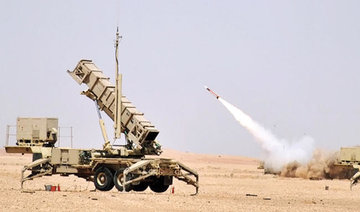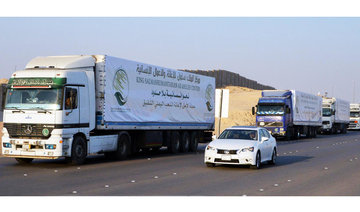JEDDAH: One of Yemen’s leading politicians has called on all parties to put an end to the fighting in his country.
Mohammed Abulahoum, chairman of Justice and Building Party in Yemen, made a series of recommendations during his lecture at the Middle East Institute in Washington, D.C.
“Enough of this fighting,” he told Arab News on Monday as he explained his proposals. “Now is the time to get to the table (for talks). Let us put our differences aside and let us go forward.”
He hoped all parties would come to their senses “and deliver something positive to the Yemeni people before the onset of Ramadan.” The holy month begins around May 27.
Abulahoum reiterated that Yemenis have never counted Tehran as an ally.
“Iran has never been, and can never be, an ally of Yemen,” he said. “Our permanent allies have always been, and will always be, the Saudis and the Gulf states.”
During his visit to Washington, Abulahoum met with senior members of the Trump administration.
The lecture at the Middle East Institute was delivered last week and Abulahoum’s message of reconciliation was met with positive response.
Opening the lecture, he said: “I’m not here to defend or attack. My main objective today is to find ways to help ordinary citizens who are affected the most rather than to help the conflicting factions.”
He said Iran had played a negative role in the region. “We can’t deny that they have ambitions in the region and have played a destabilizing role by supporting non-state armed groups,” he said. “Yemenis don’t view Iran as an ally.”
He blamed his country and other regional powers for “mishandling” the situation and inadvertently helping Iran. “Iran’s investment in Yemen is minimal, (but) the return has been high due to us and other regional powers mishandling the situation,” he said.
He said Yemen will always be “either a point of strength or weakness” to Saudi Arabia and the Gulf. “It is about time that we all work together to ensure that Yemen is a source of stability — after all, this is the only option we have,” said Abulahoum.
He urged the new US administration to play its part. “The Trump administration has a critical role to play,” he said. “Not only in Yemen but the whole region.”
Addressing the Trump administration directly, he said: “Our region is waiting to see what you will do in an area facing many challenges. You can start by helping Yemen become a success story in an area that desperately needs hope.”
He listed the challenges that stared the region in the face. “There is a humanitarian challenge as a result of hunger,” he said. “If not properly dealt with immediately, we will face a catastrophic situation.”
Then, he said, there is the danger of the expansion of radical groups, such as Daesh and Al-Qaeda in the Arabian Peninsula (AQAP), as a result of fighting and the absence of a state.
“There is no time to waste; Yemenis have suffered enough,” he said. “This conflict has torn the country apart. In order to move forward, we need direct constructive talks with all conflicting groups, including the side led by (Ali Abdullah) Saleh.”
He said one needed to accept the situation in order to move forward. “We might not like the idea of talking to all sides. However, we have to put everything aside and have constructive talks. We need no spoilers,” he said.
The UN special envoy needs the support and pressure from all sides in order to go back into negotiations with the willingness to compromise, he said.
“Here, I suggest we should include Russia, France and China in the Group of 4, plus Oman, since the five members of the UN Security Council have had a united and a positive position since the first day of the conflict in Yemen,” he said.
In the south, he said, the legitimate government has to play a more productive role with all sides and not favor one over the other, especially not favoring the ones that sacrificed most in Aden during liberation.
He suggested a four-point formula to end the fighting. “One, a temporary cease-fire that will allow humanitarian access to all parts of the country on the condition that airstrikes will come to a halt, cross-border fighting and attacks will stop, no missiles will be fired, and that the Houthis will deliver a security plan for Sanaa in no later than 30 days,” he said.
Abulahoum’s second point concerns the port of Hodeidah. “It should be kept open and operate fully for all cargo under UN supervision and the Houthis should pull back from the port to an agreed upon location. After a UN inspection, shipments at the port should be handed to business people who will then distribute them to different parts of the country,” he said, and added: “Any interception by the Houthis will result in the deal being canceled.”
Point No. 3 of the Abulahoum plan is for Sanaa airport to resume flights with clear conditions and satisfactory inspections in order to serve those most in need.
Lastly, the formation of an interim government that will work with the GCC with a clear mandate to focus on reconciliation, stabilizing and preparing the country for elections within a specified time frame.
“These four points should pave the way for going back to the negotiating table with the intent of reaching a political solution that is desperately needed,” added Abulahoum.
Leading Yemeni politician suggests 4-point formula to end fighting
Leading Yemeni politician suggests 4-point formula to end fighting
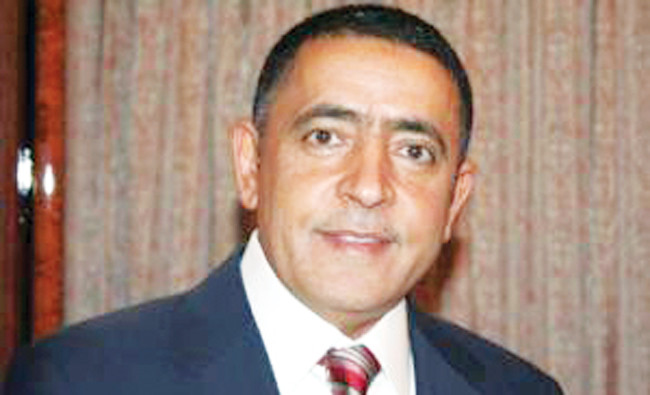
Israel strikes ‘infrastructure’ on Syria-Lebanon border

- It did not specify whether the strikes were on the Syrian or Lebanese side
JERUSALEM: The Israeli military reported it conducted air strikes on Friday targeting “infrastructure” on the Syrian-Lebanese border near the village of Janta, which it said was used to smuggle weapons to the armed group Hezbollah.
“Earlier today, the IAF (Israeli air force) struck infrastructure that was used to smuggle weapons via Syria to the Hezbollah terrorist organization in Lebanon at the Janta crossing on the Syrian-Lebanese border,” the military said in a statement.
It did not specify whether the strikes were on the Syrian or Lebanese side, but they came a day after Lebanon’s army accused Israel of “violation of the ceasefire agreement by attacking Lebanese sovereignty and destroying southern towns and villages.”
There is no official crossing point near Janta but the area is known for illegal crossings.
The UN peacekeeping force in southern Lebanon, UNIFIL, has also expressed concern over “continuing destruction” caused by Israeli forces in south Lebanon.
The Israeli military said Friday’s strikes were aimed at preventing weapons falling into the hands of Hezbollah, with whom it fought a land and air war for more than a year until a ceasefire was agreed upon last month.
“These strikes are an additional part of the IDF’s (Israeli military’s) effort to target weapons smuggling operations from Syria into Lebanon, and prevent Hezbollah from re-establishing weapons smuggling routes,” the military said.
“The IDF will continue to act to remove any threat to the state of Israel in accordance with the understandings in the ceasefire agreement.”
The truce went into effect on November 27, about two months after Israel stepped up its bombing campaign and later sent troops into Lebanon following nearly a year of exchanges of cross-border fire initiated by Hezbollah over the war in Gaza.
Israel hospital says woman killed in stabbing attack in coastal city

- Israel’s police said the suspected attacker had been arrested
HERZLIYA, Israel: An Israeli hospital reported that a woman in her eighties was killed after being stabbed in the coastal city of Herzliya on Friday, while police stated that the suspected attacker had been arrested.
“She was brought to the hospital with multiple stab wounds while undergoing resuscitation efforts, but the hospital staff was forced to pronounce her death upon arrival,” Tel Aviv Ichilov hospital said in a statement. Israel’s police said the suspected attacker had been arrested.
Yemen Houthis claim missile attack on Tel Aviv airport: statement

- Houthis also launched drones at Tel Aviv and a ship in the Arabian Sea
SANAA: Yemen’s Iran-backed Houthis on Friday claimed a strike against the airport in Israel’s commercial hub of Tel Aviv on Friday, after Israeli air strikes hit rebel-held Sanaa’s international airport and other targets in Yemen.
The Israeli strikes on Thursday landed as the head of the UN’s World Health Organization said he and his team were preparing to fly out from Yemen’s Houthi rebel-held capital.
Hours later on Friday, the Houthis said they fired a missile at Ben Gurion airport and launched drones at Tel Aviv as well as a ship in the Arabian Sea.
No other details were immediately available.
Yemen’s civil aviation authority said the airport planned to reopen on Friday after the strikes that it said occurred while the UN aircraft “was getting ready for its scheduled flight.”
The Israeli military did not immediately respond to a request for comment on whether they knew at the time that WHO chief Tedros Adhanom Ghebreyesus was there. Israel’s attack came a day after the Iran-backed Houthi rebels claimed the firing of a missile and two drones at Israel.
Yemen’s Houthis have stepped up their attacks against Israel since late November when a ceasefire took effect between Israel and another Iran-backed group, Lebanon’s Hezbollah.
The Houthis Al-Masirah TV said the Israeli strikes killed six people, after earlier Houthi statements said two people died at the rebel-held capital’s airport, and another at Ras Issa port.
The strikes targeting the airport, military facilities and power stations in rebel areas marked the second time since December 19 that Israel has hit targets in Yemen after rebel missile fire toward Israel.
In his latest warning to the rebels, Prime Minister Benjamin Netanyahu said Israel would “continue until the job is done.”
“We are determined to cut this branch of terrorism from the Iranian axis of evil,” he said in a video statement.
UN chief condemns ‘escalation’ between Yemen’s Houthis and Israel

- UN Secretary-General Antonio Guterres calls Israeli strikes on Sanaa airport ‘especially alarming’
NEW YORK: The UN chief on Thursday denounced the “escalation” in hostilities between Yemen’s Houthi militias and Israel, terming strikes on the Sanaa airport “especially alarming.”
“The Secretary-General condemns the escalation between Yemen and Israel. Israeli airstrikes today on Sana’a International Airport, the Red Sea ports and power stations in Yemen are especially alarming,” said a spokesperson for UN Secretary-General Antonio Guterres in a statement.
Israeli air strikes pummeled Sanaa’s international airport and other targets in Yemen on Thursday, with Houthi militia media reporting six deaths.
The attack came a day after the Houthis fired a missile and two drones at Israel.
World Health Organization chief Tedros Adhanom Ghebreyesus said on social media he was at the airport during the strike, with the UN saying that a member of its air crew was injured.
The United Nations put the death toll from the airport strikes at three, with “dozens more injured.”
UN chief Guterres expressed particular alarm at the threat that bombing transportation infrastructure posed to humanitarian aid operations in Yemen, where 80 percent of the population is dependent on aid.
“The Secretary-General remains deeply concerned about the risk of further escalation in the region and reiterates his call for all parties concerned to cease all military actions and exercise utmost restraint,” he said.
“He also warns that airstrikes on Red Sea ports and Sana’a airport pose grave risks to humanitarian operations at a time when millions of people are in need of life-saving assistance.”
The UN chief condemned the Houthi militias for “a year of escalatory actions... in the Red Sea and the region that threaten civilians, regional stability and freedom of maritime navigation.”
The Houthis are part of Iran’s “axis of resistance” alliance against Israel.
Bodies of about 100 Kurdish women, children found in Iraq mass grave

TAL AL-SHAIKHIA, Iraq: Iraqi authorities are working to exhume the remains of around 100 Kurdish women and children thought to have been killed in the 1980s under former Iraqi ruler Saddam Hussein, three officials said.
The grave was discovered in Tal Al-Shaikhia in the Muthanna province in southern Iraq, about 15-20 kilometers (10-12 miles) from the main road there, an AFP journalist said.
Specialized teams began exhuming the grave earlier this month after it was initially discovered in 2019, said Diaa Karim, the head of the Iraqi authority for mass graves, adding that it is the second such grave to be uncovered at the site.
“After removing the first layer of soil and the remains appearing clearly, it was discovered that they all belonged to women and children dressed in Kurdish springtime clothes,” Karim told AFP on Wednesday.
He added that they likely came from Kalar in the northern Sulaimaniyah province, part of what is now Iraq’s autonomous Kurdistan region, estimating that there were “no less than 100” people buried in the grave.
Efforts to exhume all the bodies are ongoing, he said, adding that the numbers could change.
Following Iraq’s deadly war with Iran in the 1980s, Saddam’s government carried out the ruthless “Anfal Operation” between 1987 and 1988 in which it is thought to have killed around 180,000 Kurds.
Saddam was toppled in 2003 following a US-led invasion of Iraq and was hanged three years later, putting an end to Iraqi proceedings against him on charges of genocide over the Anfal campaign.
Karim said a large number of the victims found in the grave “were executed here with live shots to the head fired at short range.”
He suggested some of them may have been “buried alive” as there was no evidence of bullets in their remains.
Ahmed Qusai, the head of the excavation team for mass graves in Iraq, meanwhile pointed to “difficulties we are facing at this grave because the remains have become entangled as some of the mothers were holding their infants” when they were killed.
Durgham Kamel, part of the authority for exhuming mass graves, said another mass grave was found at the same time that they began exhuming the one at Tal Al-Shaikhia.
He said the burial site was located near the notorious Nugrat Al-Salman prison where Saddam’s authorities held dissidents.
The Iraqi government estimates that about 1.3 million people disappeared between 1980 and 1990 as a result of atrocities and other rights violations committed under Saddam.


